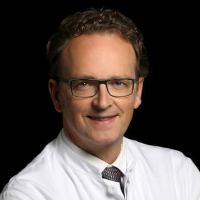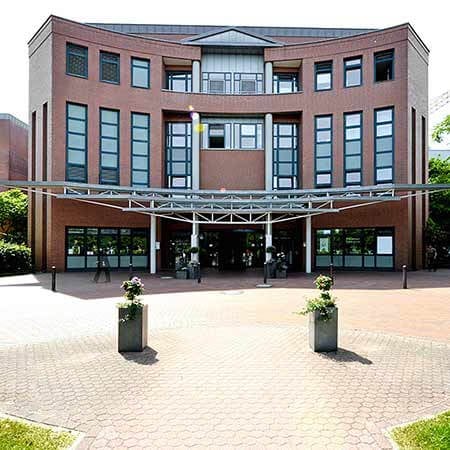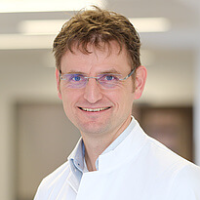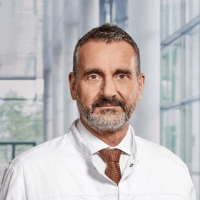Mitral Valve Insufficiency (prolapse) with Repair of Mitral Valve (minimally Invasive) in Germany
Treatment prices are regulated by national law of the corresponding countries, but can also include additional hospital coefficients. In order to receive the individual cost calculation, please send us the request and medical records.

Department of Cardiothoracic Surgery
According to the Focus magazine, the Department of Cardiothoracic Surgery ranks among the top German medical facilities specializing in the surgical treatment of diseases of the cardiovascular system and lung cancer! The department offers the full range of surgical services for the treatment of diseases of the cardiovascular system, respiratory tract, including heart and lung transplantation, artificial heart implantation. The therapeutic options include aortic surgery, coronary artery bypass grafting, transplantation surgery, surgical treatment of heart rhythm disorders (arrhythmias), minimally invasive surgery, surgical treatment of the heart valves, including reconstructive interventions. All operations are performed using state-of-the-art technology and in accordance with the current recommendations of professional societies.






Department of Cardiac Surgery
The Department of Cardiac Surgery provides a full range of surgical treatment in its area of specialization. Special emphasis is placed on heart valve repair and replacement surgery, coronary artery bypass grafting, thoracic aortic surgery, adult congenital and acquired heart disease surgery, pacemaker and defibrillator implantation, and artificial heart implantation for severe heart failure. Many heart operations are performed using minimally invasive techniques, which has a positive effect on the healing of the surgical wound. Minimally invasive cardiac procedures also reduce surgical risks and contribute to a rapid recovery of the patient in the postoperative period. Surgical treatment of cardiac pathologies is performed in advanced operating rooms equipped with the latest technology. The cardiac surgeons of the department successfully perform routine and complex surgical procedures, saving the lives of thousands of patients. The specialists work in accordance with current clinical protocols and follow the recommendations of the German Society for Thoracic and Cardiovascular Surgery (DGTHG).


Department of Cardiothoracic Surgery and Vascular Surgery
The Department of Cardiothoracic Surgery and Vascular Surgery provides effective surgical treatment for diseases of the heart, respiratory system, and blood vessels. The team of cardiac surgeons operates on patients with heart valve pathologies, coronary heart disease, heart failure, and heart rhythm disturbances. In the field of thoracic surgery, the key focus is on the surgical removal of lung tumors and lung metastases. The specialists in this area also perform surgery to repair chest wall deformities. In the field of vascular surgery, interventions for abdominal and thoracic aortic aneurysms are most often performed here. The department's vascular surgeons are also exceptionally competent in the treatment of peripheral occlusive arterial disease. A great advantage for the department's patients is that almost all surgical interventions are performed using minimally invasive techniques, so there is no need for a long postoperative recovery. The department's operating rooms are equipped with state-of-the-art technology. This allows for effective and safe treatment. The priority is always personalized medical care for patients.






Mitral valve regurgitation is a common heart disease, affecting up to 2% of the population. The main method of treatment is surgical repair. But if a patient has concomitant heart disease and pathologies of other organs, the surgical risk is too high. In this case, the operation is contraindicated, and heart valve repair can be performed using minimally invasive techniques. German hospitals perform effective procedures for minimally invasive treatment of cardiac diseases through an incision in the groin, while procedures through a short chest incision are uncommon. You can get information about the methods used and the cost of treatment in Germany on the Booking Health website.
Content
- Techniques for minimally invasive valve repair
- Where to have your minimally invasive treatment for the disease?
Techniques for minimally invasive valve repair
Many techniques have been developed to repair the valve in the event of its insufficiency. Since secondary mitral valve insufficiency is the most common, most systems aim to reduce the diameter of the fibrous ring. They are designed for a direct or indirect annuloplasty. A direct annuloplasty reduces the annulus itself, while an indirect annuloplasty reduces the coronary sinus. This creates tension that is transmitted to the fibrous ring, and, as a result, it also decreases. The main advantage of indirect annuloplasty is the technical simplicity of mitral valve repair. The minimally invasive procedure is successfully performed even by doctors with little experience, and the risk of a technical failure is very low.
The Monarc system was the first device for a minimally invasive indirect annuloplasty. It, however, failed clinical trials because 25% of patients had coronary artery occlusion.
The Viacor PTMA system has also not entered clinical practice. This is a polytetrafluoroethylene catheter that was minimally invasively implanted into the patient's coronary sinus to reduce the anteroposterior size of the mitral annulus. But it turned out that the device severely damaged the patient's coronary sinus, so it was discontinued.
The Carillon system is currently the only approved system for minimally invasive valve repair using an indirect annuloplasty. It has been used in Germany since 2011. The system has two anchors connected to each other. They are inserted using a minimally invasive technique through the patient's jugular vein. The advantage of the device is the ability to reposition or remove the system if significant mitral valve regurgitation remains after valve repair.
Recent modifications to the Carillon system have performed well in clinical trials, although it has limitations. With a severe expansion of the cavities of the patient's heart, the location of the coronary sinus relative to the mitral valve may change. If the coronary sinus is localized along the left atrium, fibrous ring compression may not be sufficient for full valve repair. However, in 85% of patients, the technical success of the minimally invasive procedure is achieved.
Another problem with early Carillon mitral valve repair devices was the frequent failure of one of the anchors. This design flaw, however, has been eliminated. Today, such breakdowns after valve repair are practically nonexistent.
The Mitralign system is a device approved in Germany for a direct annuloplasty. During a minimally invasive mitral valve repair, it is placed directly into the annulus fibrosus. With the Mitralign system, mitral valve surgery becomes more complicated. It, however, provides good results in heart valve repair. The technical complexity of the minimally invasive procedure is not a problem for patients who are treated at a good Cardiac Surgery Center. Based on the results of the minimally invasive treatment of the disease with the implantation of the Mitralign system, the diameter of the patient's valve decreases by an average of 2 cm. This is an excellent result, which provides a decrease in the severity of mitral regurgitation or complete repair of normal heart valve function.
The Valtech CardioBand system is another approved technique for mitral valve repair using minimally invasive techniques. The minimally invasive device implantation procedure is performed through a transseptal atrial approach (through the septum of the patient's heart). This is a Dacron band, which is put on the fibrous ring by screwing in the clamps. This tape is then stretched under echocardiographic guidance until it reaches the normal diameter of the heart valve opening.
The iCoapsys system consists of two epicardial pads connected by a suture. This not only reduces the size of the fibrous ring but also normalizes the shape of the left ventricle. The RESTOR-MV study showed that the minimally invasive technique is not only as good as a surgical annuloplasty but even outperforms it in terms of left ventricular size reduction, reduction in mitral valve regurgitation severity, and patient survival rates.
The ARTO system is aimed at changing the anterior-posterior size of the left atrium. The device is delivered to the patient's heart using minimally invasive techniques through the femoral vessels and then through the jugular vein and coronary sinus. A special magnetic catheter, MagneCath, is used to implant this system.
The BACE system is used to repair left ventricular function using minimally invasive techniques. This is a circular bandage with inflatable chambers. The device is placed around the basal part of the patient's beating heart. When the heart chambers are filled with saline, the subvalvular structures are displaced, resulting in a repair of the shape of the ventricle and a decrease in the severity of mitral valve regurgitation.
The NeoChord device is used for mitral valve prolapse. Valve prolapse is one of the mechanisms for the development of mitral valve regurgitation, which is associated with the deflection of the valves in the opposite direction, that is, into the atrium. Posterior mitral valve prolapse may be associated with a detachment of the chord, which is the thread that holds it. In this case, a minimally invasive chord prosthetic repair is possible to correct the prolapse.
Although this technique for treating valve prolapse is also minimally invasive, it requires a small chest incision. With the NeoChord system, a new chord is formed. If prolapse treatment results are unsatisfactory, it can be removed or additional threads may be implanted. Prolapse repair involves the threads being stretched and fixed to the left ventricular apex. Good results in the treatment of prolapse with the system were confirmed in the TACT study, where the technical success of the procedure was achieved in 87% of patients. Most patients require the implantation of 3 or 4 artificial chords to achieve the final results.
The MitraClip system is a coaptation device. This is a "clothespin" that is applied to the heart valve leaflets, bringing them together. As a result, their coaptation is repaired, and the heart valve leaflets better close the opening between the heart chambers. It is the oldest system for minimally invasive treatment of mitral valve diseases and has been in use since 2002. Tens of thousands of patients worldwide have already undergone the minimally invasive MitraClip heart disease treatment.
Where to have your minimally invasive treatment for the disease?
The surgical treatment of the disease is too traumatic. For many patients, surgery is contraindicated due to concomitant conditions of the heart and other organs. In such cases, an alternative to open surgery is a minimally invasive procedure. It can provide the same results. Unlike the surgical technique, this treatment of the disease is safer and does not require a long recovery.
Minimally invasive procedures for the treatment of heart disease are used in most major German hospitals. Treatment in Germany provides excellent results. The specialists at German hospitals use modern devices for minimally invasive treatment of cardiac diseases.
You can get information about diseases, doctors, prices, and leading surgical departments on the Booking Health website. Our website presents the current cost of treatment in Germany. When you make your appointment for minimally invasive or surgical treatment of cardiac diseases through Booking Health, the cost of treatment in Germany will be lower for you than if you contact German hospitals directly. The prices are reduced due to the absence of taxes for foreign patients.
Please leave your request on the Booking Health website to get additional information, assistance in selecting a German hospital, or a service for organizing your minimally invasive or surgical treatment in Germany. The Booking Health specialists will contact the administration of the German hospital, schedule the patient's appointment for the preferred dates, book airline tickets and the nearest hotel to the German hospital, and translate medical documents. The company's employees will meet the patient at the airport, provide interpreting services, and take the patient to the German hospital by car. After the completion of the patient's minimally invasive treatment in Germany, the company's specialists will take care of a return transfer from the hospital to the airport.
Authors:
The article was edited by medical experts, board-certified doctors Dr. Nadezhda Ivanisova and Dr. Vadim Zhiliuk. For the treatment of the conditions referred to in the article, you must consult a doctor; the information in the article is not intended for self-medication!
Sources:
ECR - European Cardiology Review

